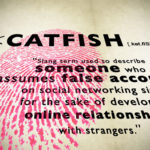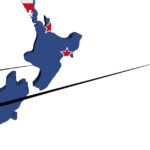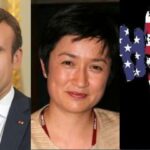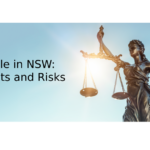The Case of Alexander Csergo and Mounting Cold War Criminalisation in Australia

Australian businessman Alexander Csergo, who has long resided in Shanghai, was arrested in Bondi by Australian Federal Police on 14 April, as part of an ASIO-initiated taskforce investigation, and he was promptly charged with reckless foreign interference and denied bail.
The “crime” the feds allege the 55-year-old award-winning tech specialist perpetrated involves two Chinese individuals, Ken and Evelyn, having asked him to compile publicly available information regarding Australian defence, economics and national security into reports in exchange for money.
Csergo has been charged under Turnbull government-passed foreign interference laws, which were heavily criticised for their broad reach at the time. And his barrister, Bernard Collaery, has called out the legislation for being so “vague” it permits agents to cherry pick who they’re applied to.
Of course, this case is occurring as our nation has been distinctly positioning itself as a key player in a potential US-led war against China, and Csergo is not the only Australian citizen to have been taken into custody on return from that country, in what appears to be growing cold war criminalisation.
While Collaery points out that attorney general Mark Dreyfus has to approve a prosecution against the offence Csergo is now facing, and he hopes that the nation’s chief lawmaker doesn’t make a decision until after his client’s bail appeal hearing in June.
A tale of two authoritarian states
“It is a scandalous misuse of laws, the legal profession opposed,” remarked Collaery, “to allow vague 2018 foreign influence laws to descend upon just some Australians working in China, when those working much closer to Beijing on mining and shipping capacity are encouraged to trade.”
“Ironically, and illustrative of the complete naivety of the AFP, it would constitute a ‘reckless’ act if an Australian working in China challenged a state enterprise employee to reveal whether he worked for the state,” the barrister told Sydney Criminal Lawyers.
Collaery explained that whilst the AFP alleges Csergo admitted he thought the Chinese pair, he first encountered in 2021, might’ve been working for intelligence, he maintains that his client “merely stated that every businessperson in China owes, by Chinese law, a first duty to the Party”.
A former ACT attorney general, Collaery considers the Csergo case further proof of the growing shift towards authoritarian governance in this country, of which he knows all too well, after having spent four recent years being prosecuted over allegedly conspiring to reveal classified information.
Of the laws that have led to his client’s arrest, Collaery makes clear that “even assisting the Catholic Church in China” would see an individual fall foul of them “as, patently, Beijing influences the appointment of Bishops”.
“The foreign influence laws mirror those in China and do not belong in a democracy,” the barrister underscored.
All-encompassing reach
Passed in June 2018, the National Security Legislation Amendment (Espionage and Foreign Interference) Bill 2018 inserted treason, sabotage, espionage and foreign interference offences into the Criminal Code Act 1995 (Cth) (the Code).
And the outcry against these laws was deafening, as civil liberties groups and legal associations pointed to breadth of interpretation that certain provisions could lead to, which they foresaw could go as far as being used to prosecute journalists and protesters.
Collaery pointed to this same issue as it currently pertains to his client, who’s charged with reckless foreign interference, contrary to section 92.3 of the Code, specifically triggering subsections (1)(a)(b)(c)(iii) and (d)(i).
This means that the Commonwealth Director of Public Prosecution is arguing that Csergo covertly engaged in conduct on behalf of a foreign principal or a person acting on behalf of a foreign principal”, and he was reckless to the fact that it would “support intelligence activities”.
The Code defines recklessness as an individual being “aware of a substantial risk” in regard to their actions, and due to this understanding, it was “unjustifiable to take the risk”.
As Collaery explains it, the “foreign principal” in this case is a “foreign public enterprise” as per section 90.3(f) of the Code, which, under section 70.1(b), is defined as “a body or association” either with its leader acting in accordance with a foreign government or being that government itself.
“You see that any ‘body’ in an authoritarian state comes within the definition,” outlined the barrister, who was pursued by the Coalition for allegedly divulging details about the Howard government having bugged its counterpart in Timor-Leste to get the upper hand in fossil fuel negotiations.
And as is Collaery’s want with the case against Csergo, Dreyfus dropped the charges against him last July.
The Red Scare
During the post World War II Cold War period, which involved tensions between US-led western allies and the Soviet Union, communist sentiments and associations were criminalised throughout Europe and in the US, where McCarthyism, or the Red Scare, led to widespread prosecutions.
And with the Australian government asserting that Csergo broke the law by passing on publicly available information about AUKUS and the Quad – both US and Australian security alliances focused on China – to Chinese individuals sounds very much like the cold war mentality of old.
The case of Australian citizen Daniel Duggan adds credence to this claim, as, similar to Csergo, this former US Marine Corps fighter pilot is currently being remanded in an Australian prison, classed as a high-risk inmate and being held in isolation.
Duggan was taken into custody last October on behalf of the US, as it wants to extradite him over claims that he broke the law when training Chinese pilots in South Africa early last decade. And the father-of-six was arrested after he returned here from China, where he had long been working.
At the time of Duggan’s arrest, the UK had just announced it was investigating 36 former British pilots in relation to training their Chinese counterparts, despite this being a decades-old practice, which was perfectly sound prior to the recent beating of the drums of war.
Duggan last appeared in court on the first of this month, and his solicitor Dennis Miralis raised the case for a temporary stay on proceedings being warranted, as the Inspector General of Intelligence and Security had recently determined to investigate the legitimacy of the prosecution.
Saffrine Duggan explained after the hearing that her husband was set to face “another 86 days in maximum-security solitary confinement with no Australian charges” prior to his next appearance, and she added that the US had “generously” allowed for a stay to be argued in an Australian court.
Collateral damage
“Of course, we need laws that protect our national secrets and protect our national interest, but they should never come at the loss of core civil liberties,” Greens Senator David Shoebridge said, in relation to the Coalition’s foreign interference laws that have seen Csergo remanded in gaol.
“It is extremely hard to understand how the law can be applied to make it an offence to disseminate materials that are already on the public record.”
In relation to the Duggan case, Shoebridge outlined in March that he didn’t think “the scare campaign about links with China” had arisen simply by chance at the same time the Albanese government is trying to convince the public to spend big on “US and UK weaponry targeted at China”.
The AUKUS pact involves the establishment of a joint rotational US-UK nuclear-powered submarine force in Australia by 2027, prior to our nation then acquiring eight of its own attack-class submarines, which is all in aid of rising tensions with Beijing.
Whilst a Quad Leaders’ Summit is set to take place in Sydney on 24 May. The Quad is an alliance between the US, Australia, Japan and India that has become of increasing importance as the build up to a potential war with China escalates.
Indeed, with the globe now focused on tensions in the Indo Pacific, with constant AUKUS, Quad and NATO meetings taking place with Beijing clearly being a key point on the agenda, it’s hard to see how Csergo having passed on information he sourced on the web poses any risk to national security.
“Laws targeting terrorism and foreign interference should be used judiciously and reflect significant harm intended or done, not mere foolishness or poor judgment,” Shoebridge told Sydney Criminal Lawyers.
“Vague foreign interference laws with harsh penalties and proceedings undertaken in secret are an attack on our civil liberties, they don’t keep us safer and can result in serious miscarriages of justice,” the senator said in conclusion.







